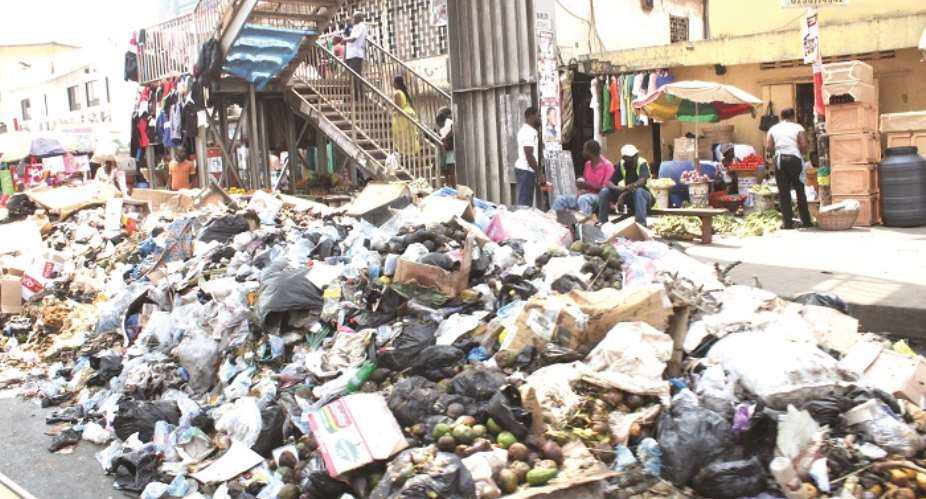Stakeholders within the Awutu Senya East Municipality in the Central Region have agreed to coordinate their activities to tackle sanitation and hygiene problems bevelling the community.
This followed a municipal level stakeholders' forum organized by intervention Forum (IF), a non-governmental organization, under its Voice for Change Partnership (V4CP) project.
The aim of the project is to strengthen the capacity of local Civil Society Organizations (CSOs) to generate reliable and relevant data/evidence to carry out evidence-based advocacy for sustainable improvements in key focus areas, namely Renewable Energy, Water, Sanitation &Hygiene (WASH), and Food Security and Nutrition.
At the forum at Kasoa, the stakeholders, led by the Environmental Health Service Unit (EHSU) of ASEMA, reviewed their collaborative efforts so far made to effectively deal with sanitation and hygiene issues within the municipality.
They also resolved to strengthen their level of cooperation and coordination so far chalked in dealing with the boggling sanitation and hygiene issues in the various communities within the municipality.
The meeting brought together officials from the EHSU, Planning Department, Information Services Department, Ghana Education Service, and National Commission for Civic Education (NCCE), Zonal and Unit Committee members and civil society organizations.
Giving a brief introduction, Madam Nora Ollennu, Chief Executive Officer (CEO) of the IF, drew the attention of the participants to emerging issues emanating from previous meetings with them.
These ranged from the level of intra-coordination between the EHSU and the other departments on sanitation and health issues, key financial support, creation of a Municipal Environmental Sanitation Fund, and the prospects for a sustained and increased budgetary fund dedicated to sanitation and hygiene over the medium-term period.
Other issues bordered on the progress made by the ASEMA to carry out improvised night-time revenue mobilization and food hygiene regulation, the targeting of private sector entities such as financial institutions, churches to fulfil their social corporate responsibilities in the provision of sanitation and hygiene service.
The stakeholders also brainstormed on the sensitization of the citizenry to bye-laws and the national policy paradigm shift from the construction ones and plans to encourage the construction of biogas for the poor project.
Crucial to the sanitation and hygiene crusade, the stakeholders agreed, was periodic evidence generation and regulated monitoring and evaluation of S&H and updating of existing data to inform planning for station and hygiene delivery as well as the periodic capacity strengthening of zonal sanitation officers.
They again assessed progress on the signing of Memorandum of Understanding (MOU) by private waste management firms to allow for effective regulation by ASEMA, commending the assembly for having begun data collection on household toilet ownership in Kasoa Zongo and its environs in May, this year.
Madam Nora Ollennu, CEO, IF, observed in her opening address that the sanitation and hygiene sub-sector was stifled by notable gaps such as service delivery planning, implementation and monitoring a well as by limited inter and intra-collaboration among WASH and non-WASH sector actors, financing and weak enforcement, among others.
These limitations, she said, hinged on factors and inadequacies that mounted up from the sub-national level to the national level and required tailored bottom-up approaches and vice-versa to ameliorate them.
She said, in view of these, the meeting which formed part of the scheduled 2018 V4C partnership activities, was earmarked as a workbench for municipal-level actors.
This will enable them to effectively deliberate, map out and actionize strategies towards addressing some of these existing and emerging sanitation and hygiene issues.
This activity, Madam Ollennu noted, fell under the V4CP programme, a five-year advocacy programme being implemented in Ghana by SNV in partnership with the International Food and Policy Research Institute and funded by the Dutch Directorate-General for International Cooperation.
'Primarily, the Ghana Sanitation and Hygiene for All (SH4ALL) component of the programme aims at amplifying the voice of CSOs and citizens to demand more equitable, inclusive and sustainable sanitation and hygiene services at the sub-national level,' she stated.
She therefore called on all participants to link up effectively and open up on the issues to collectively project and prescribe remedies to relevant operational sanitation and hygiene challenge and issues.
The CEO again urged the EHSO and its collaborating partners to set up specific timelines to carry out specific activities leading to the attainment of programme objectives agreed since the beginning of this year.





 We’ll no longer tolerate your empty, unwarranted attacks – TUC blasts Prof Adei
We’ll no longer tolerate your empty, unwarranted attacks – TUC blasts Prof Adei
 Bawumia donates GHc200,000 to support Madina fire victims
Bawumia donates GHc200,000 to support Madina fire victims
 IMF to disburse US$360million third tranche to Ghana without creditors MoU
IMF to disburse US$360million third tranche to Ghana without creditors MoU
 Truck owner share insights into train collision incident
Truck owner share insights into train collision incident
 Paramount chief of Bassare Traditional Area passes on
Paramount chief of Bassare Traditional Area passes on
 Two teachers in court over alleged illegal possession of BECE papers
Two teachers in court over alleged illegal possession of BECE papers
 Sunyani: Victim allegedly shot by traditional warriors appeals for justice
Sunyani: Victim allegedly shot by traditional warriors appeals for justice
 Mahama vows to scrap teacher licensure exams, review Free SHS policy
Mahama vows to scrap teacher licensure exams, review Free SHS policy
 Government will replace burnt Madina shops with a new three-story, 120-store fac...
Government will replace burnt Madina shops with a new three-story, 120-store fac...
